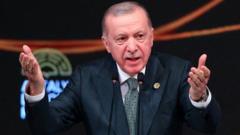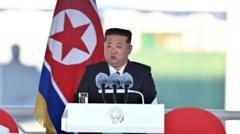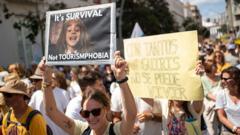The arrest of multiple journalists in Turkey, including Yasin Akgul, highlights escalating government repression against dissent and journalistic freedom following recent protests against the opposition mayor's arrest. Activists warn that such actions threaten the foundations of democracy.
Arrests of Journalists in Turkey Spark Alarming Concerns for Democratic Values

Arrests of Journalists in Turkey Spark Alarming Concerns for Democratic Values
Amid rising tensions following protests against government actions, the arrest of journalists, including renowned photojournalist Yasin Akgul, raises fears about the state of democracy in Turkey.
On the morning of March 23, as dawn broke over Istanbul, police broke into the home of Yasin Akgul, an AFP photojournalist, arresting him amidst distressing family circumstances. Hours prior, Akgul had been documenting large anti-government protests that erupted after the arrest of Ekrem Imamoglu, the city's opposition mayor, accused of corruption—a charge many believe is politically motivated. The police arrived unannounced, shocking Akgul and his family, particularly his young children, who were unaware of the impending turmoil.
In an alarming revelation, Akgul, who has faced police violence before, described the fear that seized his household as he was taken into custody. He now stands among seven journalists arrested that morning, all engaged in covering the growing unrest—unrest that the government had sought to quell through a ban on protests.
The climate for journalism in Turkey has grown increasingly perilous as the government tightens its grip. Akgul’s arrest is seen as a direct warning to other journalists: "Don't shoot, don't speak, don't film," he recounted, believing the aim of the authorities is to suppress visual documentation of the rising civil discontent.
His powerful photographs from the protests—depicting scenes of chaos and defiance—gained international attention, capturing a pivotal moment in Turkey’s struggle for democracy. "They are trying to remove us from the front lines," Akgul stated, reflecting on the pattern of targeted arrests aimed at stifling dissenting voices.
Erdogan’s administration dismissed the protests as "street terrorism," with the president maintaining that the unrest would eventually subside. However, the reality is stark; more than 2,000 individuals, mostly students and youth, have been detained in recent weeks as dissent becomes riskier.
Lawyers for the detained, including those representing Imamoglu, have raised concerns about the integrity of the legal system, pointing to political motives behind arrests and a broad campaign against opposition figures. Ece Guner, an advisor to Imamoglu, expressed the diligence and risk involved in maintaining the right to a fair defense amidst these cracking foundations of democracy.
Despite the repressive atmosphere, the opposition's calls for change resonate with many, urging continued protests while pressing for a more accountable government. The opposition aims to push for earlier presidential elections, suggesting Erdogan might face a dire political landscape should the mayor—if freed—run for office against him.
Like Akgul, many journalists remain determined to continue their critical work, driven by the belief in their role in shaping the narrative. As protests unfold weekly, fears of ongoing arrests shadow the freedoms that define democracy in Turkey.





















